Back to school, back together
In all-campus message, Chancellor Carol Christ welcomes students, staff and faculty to campus
August 25, 2021
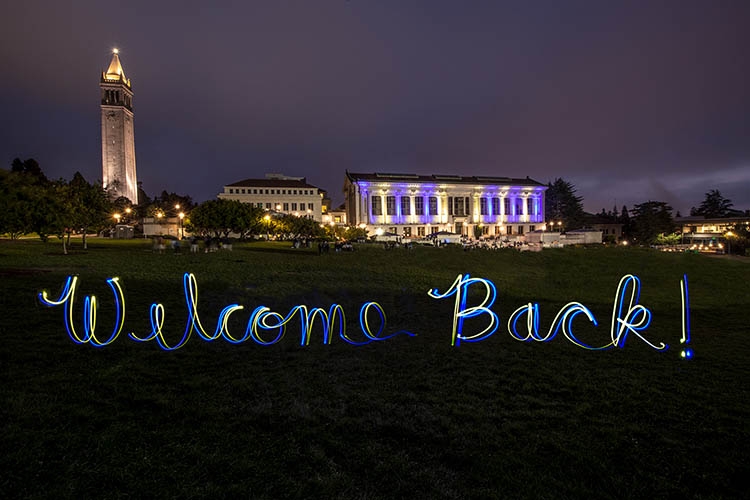
“It is now apparent that, just as the challenges of the last 18 months have been unprecedented, our unfolding transition to a new normal will also be filled with unexpected developments — some welcome, some not,” Chancellor Carol Christ wrote in a welcome message to students. (UC Berkeley photo by Keegan Houser)
Chancellor Carol Christ sent the following message to the campus community on Wednesday:
As we begin this fall semester with high hopes for our return to in-person learning, extracurricular activities and all that makes this campus an amazing, vibrant place, we are also aware of the continued uncertainties and concerns born of the pandemic’s ever-changing contours and impacts.
It is now apparent that, just as the challenges of the last 18 months have been unprecedented, our unfolding transition to a new normal will also be filled with unexpected developments — some welcome, some not. Yet, we have learned a great deal along the way and are now better prepared to face new challenges —and opportunities — in the future.
That we are here today, with open residential halls and the start of in-person instruction is no accident. The fact that Berkeley has, to date, avoided serious COVID-19 outbreaks and protected the health of its community — while maintaining the excellence of its academic programs — is the result of hard work, unity of purpose and an enduring belief in, and adherence to, scientific guidance.
In what follows, I will share with you updates on our pandemic response, news about our commitment to the needs of unhoused people and changes in our plans for new student housing in People’s Park, brief summaries of our budgetary situation and philanthropic successes, news about record-setting research funding and more.
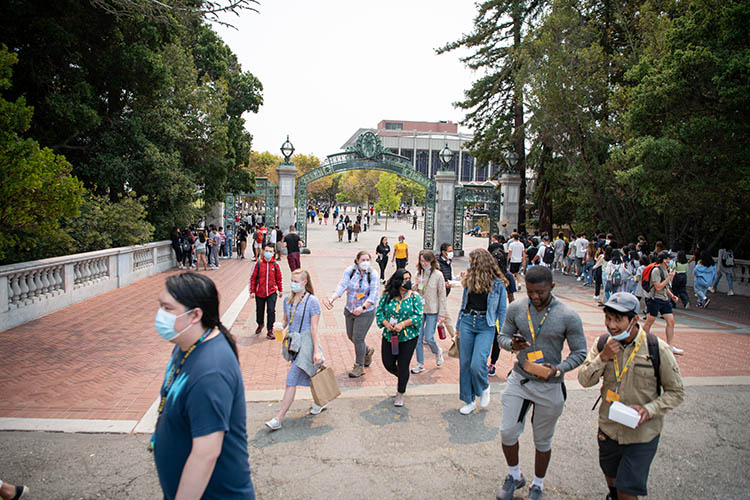
“I could not be prouder of our amazing campus community that has come together in support of its members, our university and our academic mission,” Christ wrote. (UC Berkeley photo by Keegan Houser)
First, however, I want to congratulate the 50(!) Berkeley students and alumni who competed at the summer Olympics in Tokyo. Our campus community around the world was able to cheer and take pride in our Golden Bears as they brought their very best to the highest levels of international sport.
On a more somber note, I want to express our support and sympathy for members of our community who are dealing with the consequences of challenging and disturbing incidents and events across our country and around the world. We will do everything in our power to provide aid and comfort to those impacted by the humanitarian and political crises enveloping Afghanistan, the ever-mounting toll being taken by COVID-19, the natural disasters wreaking havoc in Haiti and our own region, and continued acts of bias, discrimination and hatred directed at people solely because of their national origin, religion, race, ethnicity, gender identity or sexual orientation.
Your health and well-being
I could not be prouder of our amazing campus community that has come together in support of its members, our university and our academic mission. More than 94% of Berkeley’s students and 88% of our faculty and staff are vaccinated. Mask guidelines are being carefully followed. Testing protocols and policies are understood and respected. Our facilities are being kept clean and safe by the unsung heroes of this campus, our essential workers.
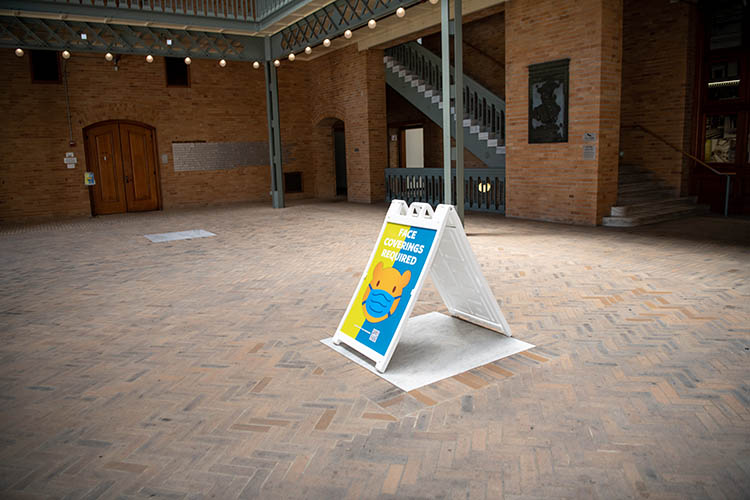
“Our facilities are being kept clean and safe by the unsung heroes of this campus, our essential workers,” Christ wrote. (UC Berkeley photo by Keegan Houser)
These are the values, practices and policies that we will continue to support and follow. We will not hesitate to modify our plans and operations if that is what the science and/or governmental guidance requires. We will continue to prioritize your health and well-being, with compassion and support for all who are in need. I urge everyone to join and extend our communal efforts to protect ourselves and each other. Visit our constantly updated coronavirus website, familiarize yourself with the resources we make available to support your physical and mental health, and if you are unsure of something, please don’t hesitate to ask.
The power and purpose of community
Even in a time of transition, there are constants at Berkeley. After an extended period of social distancing and isolation, we are more committed than ever to building and sustaining a diverse, equitable and inclusive community that offers a true sense of belonging to each and every student. I am thrilled that, one year after admitting our most diverse class in 30 years, we have exceeded last year’s admission numbers for underrepresented minority students. Even as we increase our efforts to expand the quantitative diversity of our community, that is only one part of an essential equation. We can and will work to improve the qualitative aspects of life on campus by coming together to create a truly inclusive, welcoming and supportive community where all can thrive.
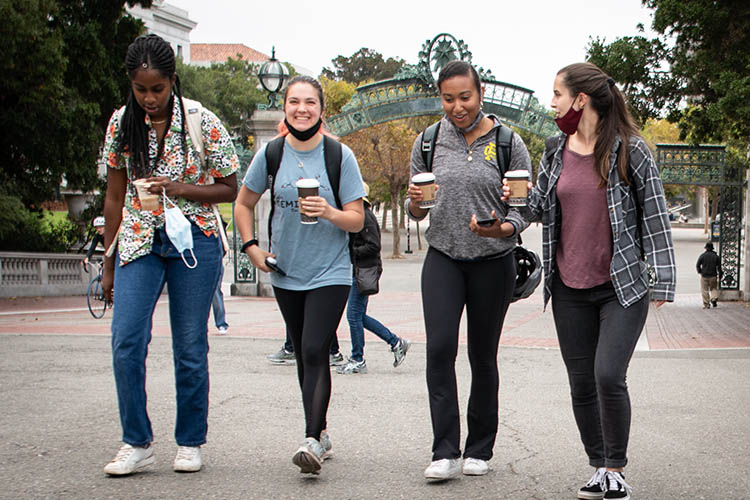
“We can and will work to improve the qualitative aspects of life on campus by coming together to create a truly inclusive, welcoming and supportive community where all can thrive,” Christ wrote. (UC Berkeley photo by Keegan Houser)
Our quest for communal diversity, strength and connection assumes even more importance given the current salience and rising urgency of issues related to social justice.
Competing for our concern and attention as the pandemic exposed and amplified societal inequities was mounting evidence that systemic racism in our country is far from being a thing of the past. In the context of our university’s belief in equity and justice, we have an opportunity to rethink and re-examine how we, in the finest Berkeley fashion, can advance the greater good model of being the change we want to see and create a truly anti-racist university. Our campus community has stood and will continue to stand in solidarity with all who are fighting today for justice and equity. I believe there is great power and potential in our research, teaching and learning, and in our collective efforts as a community.
The campus commitment to unhoused people in People’s Park and beyond
For that reason, and as part of our responsibility to the surrounding community, we are expanding the campus’s efforts to support unhoused people. We are fortunate to have a strong foundation to build on. Leading faculty members dedicate their research and teaching to the personal and societal challenges of homelessness. Our student- and volunteer-run Suitcase Clinic, as well as our School of Optometry, provide medical services to unhoused and low-income people. Berkeley Law’s Homelessness Service Project offers unhoused members of the community pro bono legal aid. And graduate students in social welfare, public health and public policy have been mentored and have participated in internships that are supervised by the campus’s full-time social worker who serves unhoused members of the community. We also continue to participate in and expand partnerships with the city of Berkeley and with non-governmental organizations that are dedicated to confronting the crisis of homelessness.
Berkeley is, in fact, one of the very few universities to hire a full-time social worker dedicated to supporting unhoused people. The center of his activity and efforts is the university-owned People’s Park, situated a few blocks south of campus and amid many of our student residential buildings. There, he works to connect those currently living in the park with the services and support they need and deserve. To date, he has already found safe, permanent housing for nearly 60 unhoused people.
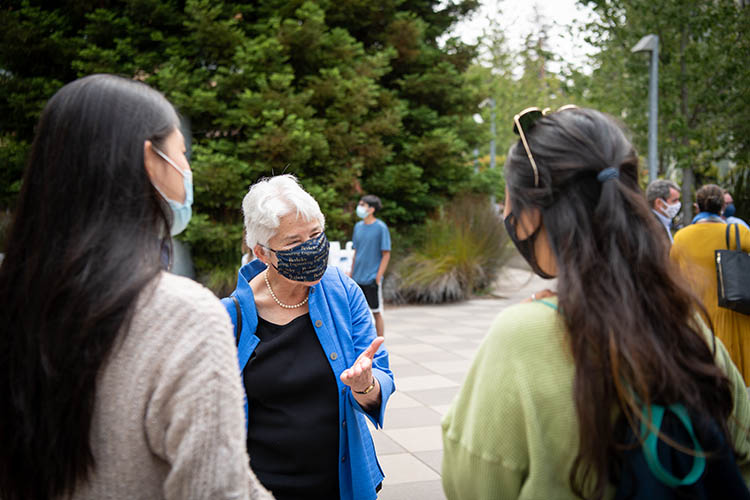
Christ met with first-year students during residence hall move-in last week. (UC Berkeley photo by Keegan Houser)
This is fortunate, as we are paying particular attention to the needs of the 40 to 50 unhoused people who are currently in the park, so that we can proceed with an important project that will benefit them, our students and the community at large. As you may know, this university is doing all that it can to address an urgent student housing crisis. This year, we had to turn away more than 5,000 students who sought room in one of our residential halls. An estimated 40% of our students can’t even find housing in the city of Berkeley. For our students’ benefit, we must build on every piece of university-owned property close to the campus, including People’s Park. Construction of a new residential hall on that site to house some 1,000 students is scheduled to begin next year, but we have changed our plans to ensure we proceed in a way that benefits all.
The university will be donating land at the park to a nonprofit organization that will build a separate “supportive housing” facility there for unhoused and very low-income people. However, we have heard the concerns of activists who fear this supportive housing may not be able to accept or accommodate all of the people now sleeping in the park, and we want to make sure they will have somewhere to go during the day once the park is closed for construction. For that reason, we have decided that construction will not begin until we are able to offer housing, services, and a daytime place to gather for the unhoused people currently in the park.
We also want to be as transparent as possible when it comes to providing accurate information about the People’s Park projects. Today, we are launching a new website with comprehensive information about our plans, and I urge all who are interested to review its contents. With more than half of the park slated to remain as green, open space and the rest of it providing new, below-market rate housing for students and extremely low-income people, I believe our plans offer a rare opportunity for a win-win-win.
The town-gown relationship
Since we first announced plans for People’s Park, I have been grateful for the partnership and support we have received from leaders in Berkeley City Hall, including Mayor Arreguín, Vice Mayor Droste and Councilmember Robinson. Given our many other areas of common interest and concern, not to mention the power of partnership, I am thrilled that the city and campus recently resolved a host of outstanding issues. We now have a profoundly important agreement that unites campus and city in efforts to address the housing crisis impacting students and city residents alike, smoothed the way for Regental approval of our long-range development plan, settled divisive litigation, and opens the door to a new era of collaboration with city government colleagues and our neighbors that I am certain will benefit all.
Our financial health
With an excellent campus long-range development plan now in place, we will be working this year to shore up our long-term budgetary health. The time has come for a comprehensive, collaborative effort to formulate and implement significant financial reforms designed to bring greater transparency, flexibility and equity to our central and unit-based budgeting process. While we will soon have more to share and say about this initiative, as well as the details of our current budgetary situation, I am relieved and pleased to report that our short-term outlook has improved due to significant federal aid and increased funding for higher education from the state of California. We are now projecting a return to a balanced budget in two years, and I am confident that we will maintain our commitment to protecting jobs and will provide the funding needed to protect the excellence of our academic core.
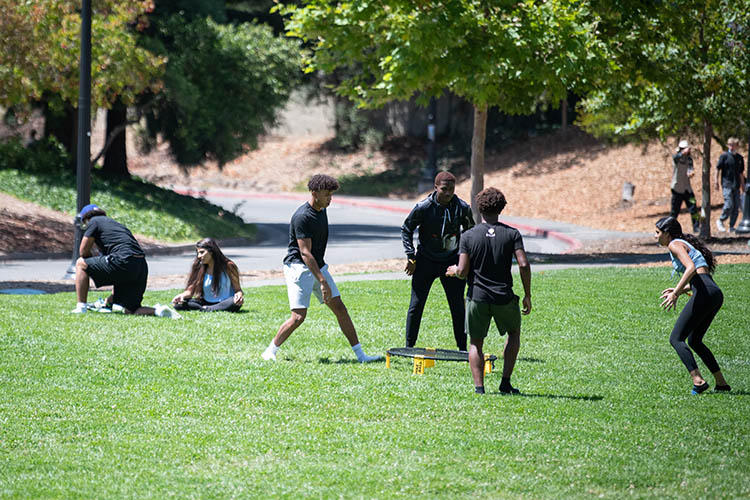
“Every day, we show how essential the public research university is to our country and our world,” Christ wrote. (UC Berkeley photo by Keegan Houser)
I also want to express our appreciation to the Regents for adopting a new cohort tuition model. With tuition playing an increasingly important role in the financial health of our campus, providing for small, regular and reliable tuition increases will offset, in part, inflationary cost increases beyond our control, while providing students and their families with a level of assurance and predictability they currently do not have, and most certainly want.
On other financial fronts, thanks to a groundswell of support, Berkeley raised $879 million in philanthropic support in the last fiscal year, the second-best fundraising year on record and the highest ever in terms of the number of gifts. During a year of tremendous challenges, this is an extraordinary show of support by our diverse community of alumni and friends, Cal parents, faculty, staff and students, whose giving affirmed Berkeley’s leadership on so many fronts. And with $4.6 billion in donations already secured for “Light the Way: The Campaign for Berkeley,” we are well on the way toward reaching our $6 billion goal.
As you’ll recall, addressing the demand for affordable student housing is a central priority of mine. To that end, I’m delighted to announce a significant milestone to provide a new housing option for graduate students in Emeryville. Thanks to a generous gift, the campus will take ownership of a newly constructed, 105-unit residential apartment complex that will be offered to graduate students at below-market rates. This new complex will include excellent access to public transportation, local shops, and markets. In addition, this new facility will also include 25,000 square feet of commercial space as a part of its innovative business model. I am delighted that this important gift will have a positive impact on the graduate student community, and help advance the campus’s strategic plan.
A record for research

Some of the more than $1.05 billion in sponsored research funds received during the last fiscal year went to support research on COVID-19. (UC Berkeley photo by Brittany Hosea-Small)
It has also been a banner year for research on our campus. For the first time ever, the campus received more than $1 billion from external, governmental and private sector sources. This is simply extraordinary for a university without a medical school, a testament to the excellence and relevance of the essential, multi-disciplinary research being conducted and the preeminence of our faculty members — including two new Nobel Prize winners in 2020 — who are dedicated to developing new knowledge and understanding in support of the greater good. The prospects look good for a repeat in the current fiscal year, which began July 1: The campus recorded $182 million in grants during the first six weeks.
Our principles of community
I would like to end this message the way it started, with some closing thoughts about the values that underpin our campus community. I believe that the excellence of our university depends on diversity of thought and perspective, both of which are the result of, and profoundly enhanced by, the diversity of our campus community.
We would not be able to accommodate and celebrate our differences without our Principles of Community, which offer a vision for the coexistence of a strong, supportive campus community and strongly held beliefs. Developed through an extraordinary collaboration among students, faculty and staff, the principles enshrine foundational values —such as respect, civility and honesty — that enable all of us to feel heard and accepted, to explore new ideas, to advocate for our beliefs, to feel safe and to thrive amid a wonderful diversity of origins, identities and beliefs. I urge all of you to read and adopt them as your own.
Every day, we show how essential the public research university is to our country and our world. Now, more than ever, humanity needs people who believe in science, in the notion of a greater good, in justice, equity, diversity, inclusiveness … and the truth. And these, of course, are the very values that form the foundation of all that Berkeley is and stands for. It is our collective responsibility to ensure it will always be so.